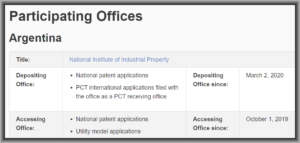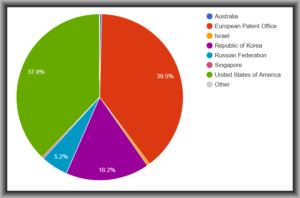A loyal reader asks:
If we have a PCT application filed in a receiving office other than the USPTO, will the USPTO record an assignment against that PCT application in advance of US national phase entry?
For example: For PCT/CN2019/123456, I have an executed English language assignment. If I file it via EPAS with the CN PCT number, will the USPTO record it?
The USPTO will record any document affecting title with respect to any US patent application. And any PCT application that designates the US counts as a US patent application (35 USC § 363) regardless of whether or not the US national phase has been entered. From this it follows automatically that the USPTO will record any document affecting title with respect to any PCT application that designates the US. (Socrates is a man, all men are mortal, therefore Socrates is mortal, that kind of thing.) You get the same answer to this question no matter which Receiving Office happens to have been selected by the filer. And it is the same answer regardless of whether the US national phase has or has not been entered. Such a recording may be carried out before the US national phase has been entered, and may be carried out even if the US national phase entry never actually happens. Such a recording may be carried out even after the international phase has ended (in other words, it can happen after the end of the 30-month period).
Actually nobody at the USPTO, no computer system at the USPTO, ever actually checks to see whether the PCT application actually designates the US. Thus actual observed behavior is that the USPTO will record any document affecting title with respect to any PCT application no matter whether or not it designates the US.
And of course the recordation is free of charge — no government fee.
And of course anyone can carry out the recordation — there is no requirement that the filer be a registered practitioner or have an address in the US.
Which then brings us to 35 USC § 261, which reminds that it is a Best Practice (indeed almost malpractice avoidance) to record any assignment within three months of its date of execution. So for example if a PCT application (designating the US) were to be assigned, it would be a Best Practice to record it at the USPTO within three months. This would be the case regardless of the Receiving Office in which it had been filed.
The alert reader might wonder, if we record against the PCT application number, and later enter the US national phase, will the recordation automatically cover the US application number? You can see the answer here.




 The Korean Intellectual Property Office has quietly rolled out several very nice features in its ISA and IPEA service. PCT filers who pick ISA/KR or IPEA/KR will want to familiarize themselves with these very nice features.
The Korean Intellectual Property Office has quietly rolled out several very nice features in its ISA and IPEA service. PCT filers who pick ISA/KR or IPEA/KR will want to familiarize themselves with these very nice features.  I still vividly recall the first time a hotel annoyed me by charging a package fee. It was a Hyatt hotel in downtown Chicago; I was attending a professional meeting about twenty years ago. I had arranged for some courier package to be sent to me, and I had to pay a $15 ransom to get the package.
I still vividly recall the first time a hotel annoyed me by charging a package fee. It was a Hyatt hotel in downtown Chicago; I was attending a professional meeting about twenty years ago. I had arranged for some courier package to be sent to me, and I had to pay a $15 ransom to get the package.